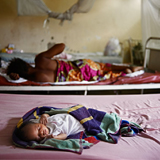
1. Background
A National Roadmap to Accelerate the Reduction of Maternal and Infant Mortality was adopted by the Rwandan Ministry of Health in 2008. The Roadmap outlines approaches to reducing maternal and newborn mortality, and includes strategies for improving the quality of facility-based primary and referral care, the availability of kangaroo mother care (KMC) and the availability of community-based services for women during pregnancy and in the post-natal period. The Roadmap builds on the National Reproductive Health Policy (2003), the National Child Health Policy (2008) and the Strategic Plan for Acceleration of Child Survival (2008-2012). All program activities are implemented in the context of the Economic Development and Poverty Reduction Strategy of Rwanda (EDPRS 2008-2012) and the National Health Sector Strategic Plan (HSSPII 2009-2012).
General approaches to implementing community-based activities are outlined in the National Community Health Policy of Rwanda (2007). The health system in Rwanda is decentralized to the district level. The country is divided into 4 provinces and the City of Kigali, 30 districts,
416 sectors, around 9,000 cells and 15,000 Imidugudu (villages). A system of community-based health insurance in the form of mutual health insurance was established in 1996. Since 2006 Rwanda has implemented a Performance Based Financing (PBF) model to provide incentives to facility-and community-based health workers. The PBF approach provides quarterly remuneration to health workers based on performance measured by defined indicators.
Please download the full resource.